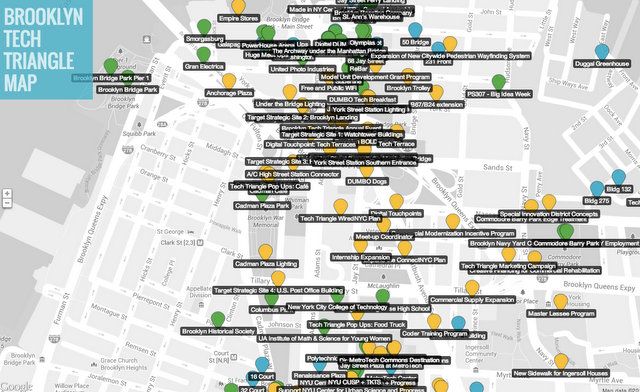NYC's Long-Awaited Davis Center Opens in Central Park
A stunning new facility at Harlem Meer opens to the public this weekend!


In Brooklyn, Dumbo’s turnaround in the 1980s was propelled by the determined effort of developer Jed Walentas, now the founder of Two Trees Management, the firm overseeing the redevelopment of the Domino Sugar Factory. Walentas’ strategy for Dumbo has been replicated as a model elsewhere: create a mixed-use residential and commercial district, transform industrial building stock, and attract unique, local retailers and restaurants via subsidized rents.
DUMBO continues to move forward, in new ways too, as part of the Brooklyn Tech Triangle. Just days after Mayor Bloomberg’s speech on planning for resiliency along the Brooklyn-Queens waterfront, the Brooklyn Tech Triangle Strategic Plan was unveiled, which includes plans to bolster an already growing tech hub encompassing not only DUMBO, but also Downtown Brooklyn and the Navy Yard.
The Tech Triangle is already home to 10% of all tech firms in the city, including well-known firm as Etsy and Makerbot, and the firms collectively support 23,000 indirect jobs. The strategic plan was developed over six months by the Brooklyn Tech Triangle Task Force, a civic group comprised of tech leaders, entrepreneurs, those in the real estate community, political representatives and educators. The group believes we are at a critical crossroads, and that without a strategic plan, New York City could lose out on a “golden opportunity” for job training.
Still, according to the Brooklyn Tech Triangle Strategic Plan developed by W X Y architecture and urban design, “the best news is that the Brooklyn Tech Triangle is still very much in its initial ascent. Firms want to locate here and the businesses that are here want to expand.” The hope is that a live-work model in the Tech Triangle could be a precedent for future development along the Brooklyn-Queens waterfront. Claire Weisz, founder of WXY architecture, tells Untapped that “the exciting thing about it is that it’s already happening.”
And it’s not just about commercial space. The plan includes the development of an ecosystem, which includes training and better integration with local firms and universities, expansion of transit connectivity via expanding bus routes, ferry stops and bike lanes, even a “21st century trolley” for transport within the triangle. Urban design initiatives are also recommended to improve streetscapes along the less activated areas of MetroTech, Cadman Plaza and below the BQE. The plan calls for an upgrade in wifi and fiber connectivity to brand the area as “tech-forward.”
Here were some interesting facts about the Tech Triangle from the strategic plan:
The DUMBO Improvement District has compiled highlights of the strategic plan while you can download the full strategic plan or its highlights on the Brooklyn Tech Triangle website. This announcement also comes just a few days after Mayor Bloomberg’s speech on planning for resiliency along the Brooklyn-Queens waterfront.
Get in touch with the author @untappedmich.
Subscribe to our newsletter